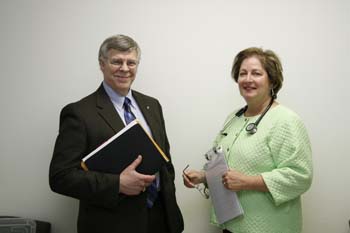| Back to Back Issues Page |
 |
|
VBPM Connection, Issue #029-- News from your Doctor's Office. January 05, 2013 |
The Virginia Beach Premier Medical NewsletterJanuary, 2012
If you would like to receive a copy of this free monthly newsletter electronically by email, go to the Newsletter Signup Page on the office website (www.vbpm1.com) and enter your email address in the signup box.
If you have a topic that you would like to see appear in the newsletter, please let us know at gjwarth@gmail.com. Twistle: Ask us about Twistle, a secure email application linking you directly to the office or to your doctor. Get answers to your personal medical questions. Change your appointment. Get your lab or x-ray results. Request prescription refills. Keep us informed. Ask the staff or your physician for more information, or click on the link...Twistle.
SSRIs Reduce the Neurologic Disability after Stroke
The major cause of disability in adults is due to stroke. A recent study by Mead, et al reveals evidence that SSRIs, which are drugs that are usually used to treat depression, actually have been found to reduce the amount of disability that people have after having had a stoke. SSRIs, like Sertraline (Zoloft), appeared in this study to improve independence, improve recovery and reduce neurologic impairment - regardless of whether patients were depressed. If this is confirmed in larger studies, we may ultimately start giving an SSRI medication routinely to patients who have had strokes.
Do We Always Need to Fast Before Getting Lipid Levels?
A study appearing in the Archives of Internal Medicine, by Sidhu and Naugler, Nov, 2012, showed that the duration of fasting (from one hour up to 16 hours) has little effect on lipid levels, or at least that the differences were not statistically significant.
Cholesterol and HDL levels varied by less than 2%. LDL variation was less than 10%, and Triglyceride variation was less than 20%. In other words, fasting overnight probably only has a minimal effect on the lipid levels that are drawn the next morning. So, if it's inconvenient for you to come in fasting just to obtain lipid levels, it's actually okay to have them drawn even if you're not fasting. The results won't be that much different.
Vasovagal Syncope
Syncope, the medical term for "passing out", has many different causes. one of the most common causes is the simple faint, otherwise known as vasovagal syncope, or reflex syncope. Another very common cause is dehydration, or lack of adequate fluid in the blood stream.
Vasovagal syncope is usually caused by some event that affects the autonomic (involuntary) nervous system. A common scenario is when a person is eating dinner and begins to develop indigestion, nausea or excessive gas. This stimulates the vagus nerve which has branches in most of our internal organs. This nerve, when stimulated, causes an involuntary reflex to occur, which results in the heart slowing down, and blood vessels dilating all over the body which in turn causes a drop in blood pressure. The blood "drains out of the head", and the person passes out. Once the individual gets to the floor, and the body is horizontal, the blood is restored to the head, and the person wakes up. There is not always a paasing out event. Sometimes there is just a feeling of dizziness, or lightheadedness. There is usually some excess salivation and excessive sweating, often described as a cold sweat. Treatments for this type of syncope are variable - some work and some don't, but most are worth trying. Even though vasovagal syncope is not an indication of a serious disease, it can result in injury to the patient due to the trauma of falling, not to mention the embarrassment and the usual 5-6 hour evaluation in the Emergency Room that usually follows and during which nothing is usually discovered as the cause. Blood tests and x-rays are almost always normal or unchanged. Diagnosis depends on a typical story like that mentioned above, along with the absence of any other obvious cause. Other things that need to be ruled out are anemia, low blood sugar, heart irregularities, seizures, mini-strokes, heart valve problems, adverse medication effect or low blood pressure. Long term treatments are available like Florinef, which causes fluid retention and therefore helps to keep the blood pressure from dropping as much. Also, just drinking lots of fluids to prevent dehydration can help. For recurring problems with syncope, the doctor may prescribe Midodrine which helps raise BP, a beta blocker which can help by restricting blood vessels in the lower legs, or even SSRIs like Zoloft, have been found to be helpful.
Hospital Bed Alarms
Hospital bed alarms are devices that sound an alarm when a patient moves out of a bed or chair so that a nurse or attendant can come to the patient's aid to potential avoid a fall. These devices are becoming increasingly popular in hospitals and nursing facilities. Although, the concept sounds like it would be beneficial for patient safety, the use of these alarms was never very well studied before their widespread implementation.
The downside is that the alarms prevent patients from being active while they are in the hospital. This results in weakness and inability to walk when it's time to leave the hospital. Many patients then have to go to a rehab facility for 2-3 before they can return home. The question is are these devices beneficial enough in reducing falls and preventing injury to be worth the risk, expense and increased morbidity to the patient because of the severe restriction of activity? A study that was done recently by Ronald Shorr and others, as reported in the Annals of Internal Medicine, showed that the alarms had NO effect of the rate of falling or the number of injuries related to falls despite a vigorous intervention of education, training and technical support. This further exemplifies the continuing problem of unstudied implementation of rules, regulations and policies by well-meaning administrative people that actually causes more harm than good.
When to Take Your Thyroid Medicine
In the past, most pharmacists have said that people with hypothyroidism should take their thyroid medication early in the morning - at least an hour before breakfast. The reason is that it's absorbed into the blood stream from the intestines better if it is taken on an empty stomach. So, you don't really have to take it in the early morning hours. You could take it at bedtime as long as it's four hours after eating supper. The most important thing is to take it at the same time every day consistently. That way, when the doctor adjusts the dose according to your blood tests, it won't vary greatly from one time to the next. If your thyroid blood tests do vary quite a bit from one blood draw to the next, the problem could be that you're not consistent enough with taking it at the same time every day.
Statins May Inhibit Cancer Growth
An observational Danish study reported recently that statin use by cancer patients was associated with a 15% drop in all-cause and cancer-related deaths. A different study showed that statins did not influence the incidence of cancer one way or the other. So, it appears that statins do not reduce the risk of developing cancer, but if a person already has cancer, it can reduce mortality risk by 15%.
Mind Over Matter?
 Fish oil supplements do not seem to help to prevent cardiovascular events. However, fish oil from natural sources like eating fish three or more times a week still holds its own as a legitimate way to reduce these problems. This was verified by a large study done recently by Chowdhury, et al, appearing in the British Medical Journal, Oct.30,2012.
Fish oil supplements do not seem to help to prevent cardiovascular events. However, fish oil from natural sources like eating fish three or more times a week still holds its own as a legitimate way to reduce these problems. This was verified by a large study done recently by Chowdhury, et al, appearing in the British Medical Journal, Oct.30,2012.
Perfume, Pets and Allergies
If you've ever known someone who has allergies, you know that sometimes exposure to certain things like pet dander and perfume can be quite distressing and can even precipitate a severe asthma attack. So, when coming into the office, in order to protect our patients and office staff, please refrain from wearing perfumes and bringing in pets. We will be forever grateful. About Our Office
Virginia Beach Premier Medical is a membership internal medicine practice specializing in comprehensive and compassionate, individualized and personalized patient-centered care. We pride ourselves on full continuity of care – in the office, in the hospital, or even at home.
The Future of Health Care
As we look to the New Year and the years beyond, it may be easy for some to become pessimistic about the future of our health care from a societal point of view. Yet there is much for which to be thankful and hopeful. After all we now have the concept and practical application of "Concierge Medicine" in this country which wasn't available before 1996. Furthermore, the idea appears to be spreading. It may end up playing a very important part in the recovery and return to better healthcare at a reasonable cost in this country. It takes at least some of the decision-making out of the hands of the government and insurance companies. It provides a better, more satisfying way to practice for primary care physicians, which should ultimately help reduce our current shortage of these providers. It will certainly provide better access to care for those who join. It will help improve the waning doctor-patient relationship that has pervaded throughout the nation. This will help more people take a greater interest in their personal health care. It will improve preventive care and reduce costs by helping keep patients out of the hospitals. Even though my glasses may be a bit rose-colored, I can see this concept growing. Our little office may be a small candle within a darkened, languishing health care system, but with lots of other little candles being lit all over the country, maybe we can bring some light, warmth and compassion to an industry that is sorely lacking in these attributes.
Best Wishes for the New Year!
|
| Back to Back Issues Page |





